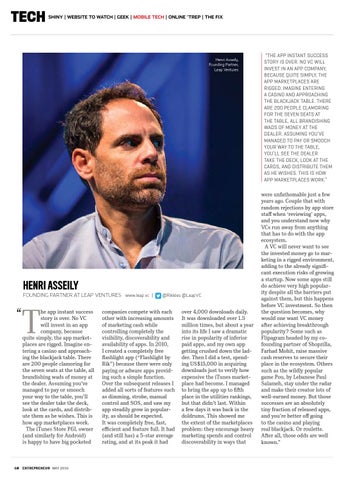TECH
SHINY | WEBSITE TO WATCH | GEEK | MOBILE TECH | ONLINE ‘TREP | THE FIX
Henri Asseily, Founding Partner, Leap Ventures
Henri Asseily founding Partner at Leap Ventures www.leap.vc |
“
68
T
he app instant success story is over. No VC will invest in an app company, because quite simply, the app marketplaces are rigged. Imagine entering a casino and approaching the blackjack table. There are 200 people clamoring for the seven seats at the table, all brandishing wads of money at the dealer. Assuming you’ve managed to pay or smooch your way to the table, you’ll see the dealer take the deck, look at the cards, and distribute them as he wishes. This is how app marketplaces work. The iTunes Store P&L owner (and similarly for Android) is happy to have big pocketed
Entrepreneur may 2016
@Rikkles @LeapVC
companies compete with each other with increasing amounts of marketing cash while controlling completely the visibility, discoverability and availability of apps. In 2010, I created a completely free flashlight app (“Flashlight by Rik”) because there were only paying or adware apps providing such a simple function. Over the subsequent releases I added all sorts of features such as dimming, strobe, manual control and SOS, and saw my app steadily grow in popularity, as should be expected. It was completely free, fast, efficient and feature full. It had (and still has) a 5-star average rating, and at its peak it had
over 4,000 downloads daily. It was downloaded over 1.5 million times, but about a year into its life I saw a dramatic rise in popularity of inferior paid apps, and my own app getting crushed down the ladder. Then I did a test, spending US$15,000 in acquiring downloads just to verify how expensive the iTunes marketplace had become. I managed to bring the app up to fifth place in the utilities rankings, but that didn’t last. Within a few days it was back in the doldrums. This showed me the extent of the marketplaces problem: they encourage heavy marketing spends and control discoverability in ways that
“The app instant success story is over. No VC will invest in an app company, because quite simply, the app marketplaces are rigged. Imagine entering a casino and approaching the blackjack table. There are 200 people clamoring for the seven seats at the table, all brandishing wads of money at the dealer. Assuming you’ve managed to pay or smooch your way to the table, you’ll see the dealer take the deck, look at the cards, and distribute them as he wishes. This is how app marketplaces work.”
were unfathomable just a few years ago. Couple that with random rejections by app store staff when ‘reviewing’ apps, and you understand now why VCs run away from anything that has to do with the app ecosystem. A VC will never want to see the invested money go to marketing in a rigged environment, adding to the already significant execution risks of growing a startup. Now some apps still do achieve very high popularity despite all the barriers put against them, but this happens before VC investment. So then the question becomes, why would one want VC money after achieving breakthrough popularity? Some such as Flipagram headed by my cofounding partner of Shopzilla, Farhad Mohit, raise massive cash reserves to secure their place in the ecosystem. Others such as the wildly popular game Pou, by Lebanese Paul Salameh, stay under the radar and make their creator lots of well-earned money. But those successes are an absolutely tiny fraction of released apps, and you’re better off going to the casino and playing real blackjack. Or roulette. After all, those odds are well known.”
